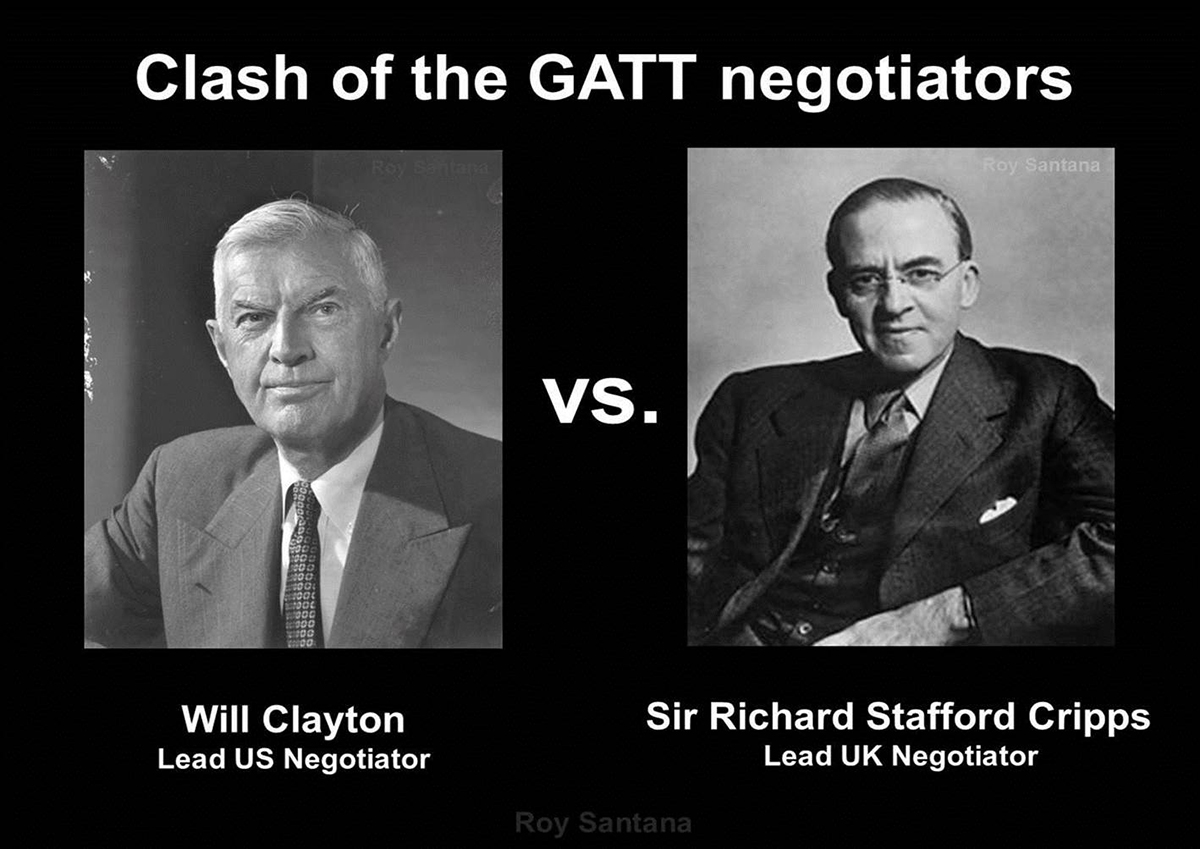gatt et conseil du commerce des marchandises
Les négociateurs du GATT dans la discorde
Septembre 1947 : après plusieurs mois de progrès satisfaisants à Genève, les négociateurs du GATT avaient abordé une phase délicate où il fallait traiter les questions les plus difficiles. Au premier chef venait l'exigence des États-Unis selon laquelle le nouveau système multilatéral devait être fondé sur le principe de la "nation la plus favorisé" (NPF). La clause NPF ainsi proposée prévoyait que tout privilège accordé à tout pays devait être accordé immédiatement et sans condition à toutes les parties contractantes du GATT.

Avertissement:
Ce texte est fondé sur des recherches effectuées par Roy Santana, Conseiller à l'OMC. Il ne s'agit pas d'une publication officielle de l'OMC.
Secretary of State Cordell Hull, the champion of free trade internationalism, was convinced that US exporters should not continue to be harmed by the large number of preferential regimes that had proliferated prior to the Second World War, and in particular the preferences stemming from the British Commonwealth of Nations, considered by the United States to be a protectionist perversion. Political support was strong, as even President Harry Truman was behind the idea of wiping out all discriminatory trade practices.
Sir Richard Stafford Cripps, President of the British Board of Trade, disagreed and strongly continued to oppose the dogmatism of the "American free traders". For him, the immediate elimination of the "Ottawa System of Imperial Tariff Preferences" was a red line that could not be crossed, as it would severely impact the already weak post-war economies of the Commonwealth.
Members of the British Empire enjoyed tariff preferences (i.e. a lower duty of rate than third countries), which had been designed in 1898 as a means for commercial integration, and further developed in the Ottawa agreement of 1932 as a response to the Great Depression. Back in Britain, the immediate implementation of the MFN clause was perceived as naïve dogmatism and a selfish idea by the US negotiators.
While embracing the ultimate goal of eventually achieving MFN trade, the British considered that considerable time would be required for their economy to adjust. It was feared that an immediate elimination of tariff preferences would lead to a ruinous trade deficit and a balance of payments crisis, as had nearly happened at the beginning of 1947 with the "dollar crisis". Australia, Canada and other Commonwealth members were also concerned about the US proposal and were not ready to sacrifice their economies in the GATT negotiations. Even John Maynard Keynes, the famous economist, had publicly argued that the ongoing British problems required the United Kingdom to use tariffs to protect its domestic industries, expand output and increase employment.
While the Americans were willing to bargain for a fair deal, they considered that the British position was unacceptable, as the United States would have to grant large-scale tariff concessions before Britain would take action to reduce its trade preferences. Frustration within the US delegation was growing. In a letter to capital dated 30 September 1947, lead negotiator Winthrop Brown described the situation as follows: "It is an absolutely beautiful day. The lake is very blue, the hills look like a picture postcard, and the only blots on the landscape are British preferences about which I spend most of the night dreaming."
Secretary of State Cordell Hull was replaced in the midst of the negotiations by Will Clayton who, unfortunately for the British, continued insisting on immediate MFN conditions as the only possible outcome of the GATT. Why should the United States, the most important victor of World War II, be asked to make one-side sacrifices? Sir Richard Stafford Cripps told an infuriated Clayton to simply withdraw some tariff offers if he was unhappy with the British concessions. The Anglo-American alliance entered a tense phase which was complicated by the personal animosity between Clayton and Stafford Cripps.
Convinced of the fairness of their positions, the Americans and the British dug their heels in and grew deeply entrenched. Clayton had had enough with the British stubbornness and proposed to walk away from the negotiating table. Short of a miracle, the GATT negotiations appeared doomed to fail.
Source: Roy Santana based on Thomas W. Zeiler (1997), "GATT Fifty Years Ago: U.S. Trade Policy and Imperial Tariff Preferences", Department of History, University of Colorado at Boulder.